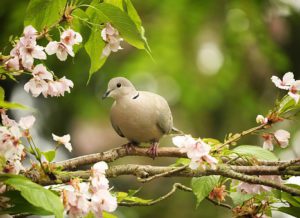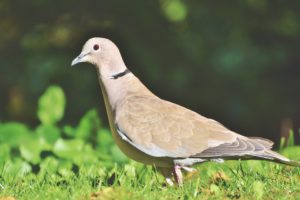Steps in caring for doves

Doves are beautiful birds that are used as a symbol of peace and love, in the Christian cycle especially among the early church we see these birds widely used. There are more than 200 species of doves some of which are the ring-neck dove, common ground dove, mourning dove, Inca dove, red turtle dove, etc…
Attracting doves to your garden and landscapes is a great way to not only have a wildlife garden but helping to bring balance to our eco-system by giving nature a helping hand. As a child both my brother and I who is the elder raised pigeons which are also a part of the dove family.
My personal story
I have so many fond hood memories of my childhood days like going to the beach during the summer breaks, going fishing with my dad who is now deceased, Christmas time which was one of my favorite time of the year and still is but what I also remembered was those days when both my brother and I would make and set dove traps.
These traps were made from sticks and nails that were shaped something like a pyramid which one end was propped up by a stake, a fishing line was tied to the stake which propped up the trap. We would place rice under the trap hide and wait it was like going fishing when the dove went under the trap to eat the rice we would then tug on the line which would trip the stake causing the dove to be trapped.
We had a cage that we also build that housed these doves as we catch them. There were so many of them, we fed them and gave them water kept them for a few months to a year as far as I can remember because it was such a long time ago then we released them to their freedom.
What you will need to take care of doves
- Shelter
- Food Source
- A water source
- A Perch
Shelter
Purchasing or building a cage is a must for your feathered friends. The cage should be large enough especially if you are accommodating more than one dove. The cage should be kept in a cool area away from the sun especially during the summer months.
A Perch
Providing a perch is not only an added feature but benefits your dove in that they will have a resting place. Ensure that the perch is not over the water and feeding containers to avoid dove’s droppings.
Food Source
Besides the uncooked grits and rice which we gave our doves a diet of seed mix, vetch, peas oats, cracked corn, etc is great.
A water source
All living things need water for survival and with doves, there is no exception. Containers can be brought from your garden center to be placed into the cage. Check the container every few days to see if it needs to be refilled or if the water needs to change.
Hunting Doves
Doves are also popular for being hunted for food.

Additional Information
Doves are social birds.
Avoid spraying harmful chemicals like insecticides around their cage area.
Providing a nesting box will have your doves feeling right at home.
Doves are sensitive to smoke.
Ensure that the cage is kept as clean as possible.
18 Dove fun facts
Below are 18 dove facts you will enjoy.
1. As said doves are used as a symbol of peace.
2. Doves mate for life.
3. Doves can live up to 12 years or longer.
4. The larger species are all pigeons and the smaller species are called doves.
5. Doves can live in just about any climate.
6. Male and female doves raise their young together.
7. Doves eat seeds and not insects.
8. Doves can be found on every continent except for Antarctica.
9. The ring-neck and the diamond are among the smartest of the dove family.
10. Because doves are social they love to feed in a company.
11. Doves are known to produce multiple broods within a year.
12. The pigeon which is part of the dove family was used in world war 1 and 2.
13. Doves can fly 55 mph.
14. The male dove is responsible for making the cooing sound.
15. Female doves lay between 1-2 eggs.
16. The female dove lays her eggs about 8-12 days after mating.
17. Doves have a rich history, they have been around from ancient times.
18. Doves sip water through their beaks.
The final word
Taking care of the doves is really amazing, these birds are so beautiful and I am sure you will have a great time watching them. Caring for these birds which have been around for thousands of years is a great way to give nature a helping hand so go ahead and provide a home for your feathered friends. You will be happy that you did.
About the author
Norman loves being in the garden, both at home and for his job....
he is 'Natures Little helper' being outdoors, growing his vegetables and flowers from an early age.
Now having spent over 22 years in the profession he want to give some of his knowledge to others...
his vast array of hints and tips you will find scattered over this site will help you no end growing plants in your garden.
